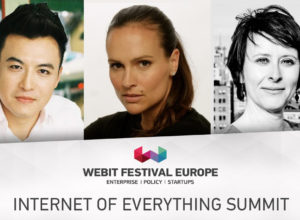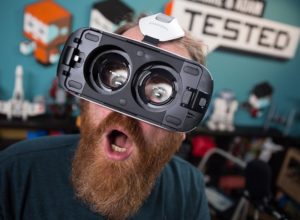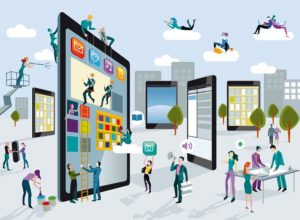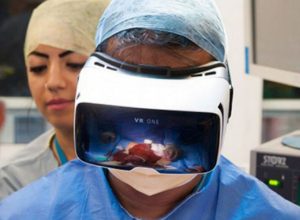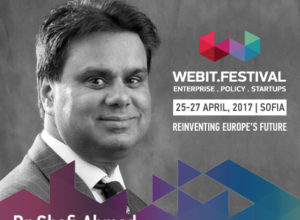Tag: vr
Take a look at the impact of IoE on our lives...
Tech experts around the world list the Internet of Everything (IoE) as one of the top trends in the digital economy. The term brings together people, processes, data and things to make networked connections more relevant and valuable than ever before and create new opportunities for businesses, individuals and countries.
Expansion of this process is connecting people in more relevant and valuable ways. It helps for converting data into intelligence and making better decisions. IoE delivers the right information to the right person at the right time, while connecting physical devices and objects to the internet.
Many new technologies will enable a wider range of IoE services and some of them will also pose interesting challenges for implementation.
The upcoming 5G tech is intended to enable network operators to evolve their current business models to support a wider variety of relationships with partners and customers in the IoE.
Meanwhile network functions virtualization and cloud technologies have the potential to radically change communications and office environments from physical world to reality where everything is software-based and easy to change.
At this year’s Webit.Festival you can listen to some of the top experts in this innovative field of digital industry. During the IoE Summit they will share their thoughts on the development of IoT, Smart Homes, M2M, Wearables, Education Tech and Virtual and Augmented Reality.
The CEO of Amyx+ Scott Amyx will show how to successfully execute in IoT and how to turn disruption into innovation. The expert is winner of the Cloud & DevOps World Innovation award and was voted among the top IoT Influencers & Experts by Inc. Magazine.
Right after him, the CEO of Elemental Machines Sridhar Iyengar will show us how IoT is helping solve the complex world of science and will explain why smart devices are still not a part of every research laboratory.
The Global Editorial Director of Wall Street Journal Custom Studios Fara Warner will speak on the best ways to tell a story in the world of virtual and augmented reality from media’s point of view.
Josh Software’s Co-founder Gautam Rege will share his thoughts on the future of smart homes, where everything happens at the touch of a button and how it will affect our quality of life.
The CEO of TechHuddle Richard Yeo will talk about the current state of ecommerce and will give his predictions for the future of IoE.
Meanwhile, the Vice President of SCA for Digital Transformation Gael De Talhouet will tell the audience about the rise of IoT and subscription models and the automation of purchases.
Here you can see a full list of the confirmed speakers at Webit.Festival, while here you can get all the information you need about the tickets for the event.
VR and AR are on their way to becoming a $120...
The tech industry, social media, marketing and entertainment in the next few years will all be shaped by the development of virtual and augmented reality and the emergence of artificial intelligence.
This industry will finally rid us of two-dimensional monitors, which for several decades played the role of a window into the virtual reality.
Experts predict that by 2020 the VR hardware market size will reach $5.2 billion, while the VR software market will be around $24.5 billion. In 2016 the worldwide sales of VR head-mounted displays were for just $1.43 million. Polls show that 44% of the people with access to internet are very interested in virtual reality.
The AR market can grow from nearly zero today to $90 billion by 2020. And half of that revenue is going to come from sales of AR hardware devices. By the end of this year worldwide AR headset sales could hit $1.2 billion. This will be perfect for Microsoft, which started selling the developer version of the mixed reality device HoloLens last year.
In 2017 we expect a huge splash by the wireless virtual reality tech. This whole process started with Apple’s adoption of new Bluetooth standard in the iPhone 7 and 7S and now we are going to see products in different categories.
The Taiwanese manufacturer of Android and Windows smartphones HTC is already taking pre-orders for a $220 add-on that cuts the cables of the headset Vive and transform it into a wireless device.
Today Facebook CEO Mark Zuckerberg showed to the world a new prototype for VR gloves, that he tested during his tour inside Oculus Research facility.
“We’re working on new ways to bring your hands in virtual and augmented reality. Wearing these gloves, you can draw, type on a virtual keyboard, and even shoot webs like Spider-Man. That’s what I’m doing here”, he wrote on his profile in the social network.
Earlier this week Google revealed its plan to bring virtual reality into the web with the new mobile browser support for WebVR in Chrome. Now the browser allows users to navigate through webpages using their fingers or mouse on desktop PC.
If you want to keep up with the hottest trends in the world of virtual and augmented reality Webit.Festival is the right place for you. During our summits, you can listen to top level speakers such as the Partner in IBM Ventures Christoph Auer-Welsbach, the VP & CTO of VMware for EMEA region Joe Baguley and the General Manager of PlayFab for Europe Mark Val.
Chat bots are taking over the online advertising
During the last few years we have witnessed incredible growth and transformation in the digital advertising industry, which were driven mainly from the expansion of mobile tech and the new types of wearable devices on the market.
According to 2016 internet advertising revenue report digital video has generated the greatest gain of any format across desktop and mobile. The revenues continue to go up, despite the mass adoption of apps and programs for ad blocking.
Many experts predict that the industry will be driven forward by the need to deliver better and fewer ads to the customer.
Most of them believe that 2017 will be the year that messaging services will take the lead. The reason for that is the rise of chat bots, who are attracting more and more budgets.
But new types of bots are bringing some risks along with the value they add. Machines that create fake clicks and views can also steal information for our credit cards. This will put additional pressure on the cyber security and privacy experts, who will have to find out new ways to protect us from ad frauds and detect the toxic bots.
Right now about 60% of Google’s net global ad revenue comes from mobile, up from about 45.8 percent in 2015. The company expects that by 2018 almost 75% of its ad revenues worldwide will come from mobile ad placements.
The development of messaging apps like Facebook’s Messenger and WhatsApp is proving that customers want a more direct and private communication. We can expect to see entirely new options for paid content.
The global practice chairman of Edelman Digital Kevin King predicts that the billions of daily users in the messaging platforms will enable marketers to make the best of new engagement opportunities. He is sure that these conversational experiences will combine past revolutions in e-commerce and text services, while in the highlighting the potential of AI.
Meanwhile, the mass production of VR and AR devices will bring significant improvement in software and will increase brand efforts to penetrate this new market.
If you want to keep up with the hottest trends in the world of marketing Webit.Festival is the right place for you. During the Marketing & Innovation Summit, you can listen to top level speakers such as the Global Editorial Director of Wall Street Journal Custom Studios Fara Warner, the President and Global Brand Director of Havas Worldwide Jason Jercinovic and the Head of CMO practice of Forbes Media Bruce Rogers.
5 disruptive tech trends to watch in 2017
We are living in increasingly digital world, but there are several emerging technologies, that will probably be a catalyst for long-term innovation. In 2016 tech like AI, VR, AR, Chatbots and automated cars took major leaps in terms of their adoption and we can certainly say that robots are no longer coming, because they are already here.
In the age of digital transformation disruption has become the key word for innovative businesses. And now almost every industry from transport to finance is facing big changes through technology.
This year we can expect more connectivity, more automation and more significant impact of technology in investment and business than ever before. Here are the 5 most important technological trends that everyone must watch for:
Artificial Intelligence (AI)
Artificial intelligence is already a part of journalism, healthcare and even customer support with the rise of chat bots. Many expert believe that 2017 will be the year we embrace the cultural shift and start trusting AI with more and more jobs, that were previously done manually.
Facebook CEO Mark Zuckerberg showed us the best of smart homes innovation with his house virtual assistant, but there is still a lot to come. Gartner defined AI and machine learning as the two most disruptive trends of the year.
Virtual Reality (VR)
This year virtual reality is finally breaking the limits of digital entertainment and gaming sectors and is going out in the mainstream. The two spheres, that are most likely to benefit from the invasion of VR are Education and Healthcare. But soon the next reality will be found in nearly every aspect of our lives.
Now it’s up to the business to find out how virtual reality can add value to its marketing, customization of products and much better customer experience.
Immersive experiences with AR and VR are reaching tipping points in terms of price and capability but will not replace other interface models.
3D Printing
Although 3D printing can hardly be defined as a new technology, the real advances in this field came during the last 5 years. 3D printing is going to disrupt manufacturing, e-commerce and retail, not only with new method for mass production, but with ways for personalization.
Meanwhile, the idea for Tesla’s smart factories, in which machines are building machines, are just a step towards the concept of self-replication robotics, drones and home systems.
Digital Identification & Biometrics
With the coming age of IoE we are quickly moving to a time, where our personal information will all be stored biometrically. This process has already started with fingerprint sensors on our phones, but soon the biometric identification will spread to face recognition and iris scans.
This year will mark the beginning of ”digital twin” representation. This innovation will allow analysis and simulation of real world conditions and improving of operations using data on how the components of a device operate end respond to environment.
Automated vehicles
The era of automated vehicles is just around the corner. It will affect not only the sector of transportation, but also the labour market, city traffic and air quality and even the way we spend our free time.
The driverless cars will offer numerous social benefits, such as better personal mobility, decline in the number of injuries and fatalities and increased productivity, due to the time freed up while traveling.
Although we can’t expect a fully autonomous car this year, we will see more and more companies present their concepts about their future models, where the driving is not the focal point of the user experience.
In the next few years we will see self-driving taxi services, provided by companies like NuTonomy, Uber and Lyft, while automation giants, such as Ford, BMW and Toyota will continue their work on providing the best product for this new market niche.
You can learn more about the newest trends in technology sector by attending to Webit.Festival Europe. During the two-day agenda of the festival in Sofia you can listen to top level speakers from all over the world, who will share their experience on topics, such as Marketing & Innovation, FinTech & Blockchain, Big Data & Cloud, IoE, Digital Transformation, Security & Privacy, Health & Wellbeing and Mobility.
VR in the world of Digital Health
By the end of the decade the market for digital health products and services will be at least $233 billion. Big part of this growth is due to the development of technologies for virtual (VR) and augmented reality (AR).
Digital health is already helping us to manage, track and improve our health and is improving our living standard.
This innovative sector in medicine is only a part of the healthcare revolution in the last century, that has led to an increase in life expectancy worldwide with more than 25 years.
Now that we are close to the limits of our lifespan limits the industry is more concerned with the topic of making our life not just longer, but more productive, especially during the years after 55.
The healthcare of the new generation will soon increase efficiency in the delivery of services, reduce costs and personalize the whole process of treating the ill.
Last year the 3D Visualisation Aesthetics Lab at the University of New South Wales managed to develop an actual model of cancer cell using the data from a high-resolution electron microscope and a CGI.
This can totally transform the cancer treatment after decades of peering into a microscope to examine cells.
Meanwhile the Australian VR company Liminal is trying to provide better life experience for people, who aren’t able to leave their hospital bed. The reason for that is not just comfort, but the fact that loneliness is often linked to higher risk of disease and slower recovery time.
The VR and AR are already revolutionizing the surgical education and training. If you find this interesting you can meet in person the pioneer in this new branch of medicine Dr Shafi Ahmed. He is one of the first confirmed speakers for the Digital Health Summit during Webit.Festival 2017 in Sofia.
Dr Ahmed is the first person in the world who live-streamed an operation using Google Glass. In 2014 he showed the world the removing of cancerous tissue from the liver and bowel of a 78-year old man.
You can watch a link here. But beware, there are graphic images.
In an online poll, nearly 90% of the students who watched the live video said that they want this type of learning process to be part of their curriculum.
During the Digital Health Summit you can also learn the latest trends in EHRs, Telehealth Systems & Telemedicine Developments, Mobile Health Applications & Devices, Medication monitoring & Wellness Devices, Chronic Care Management, Genetic Science and Pharma Technologies.
Use of VR during surgeries? It is reality already!
Digital health is among the topics at Webit Festival - it starts with the champion of new technology in medicine Dr Shafi Ahmed who will show how virtual and augmented reality can revolutionize surgical education and training.
One of the first confirmed speakers for Webit.Festival 2017 in Sofia is Dr Shafi Ahmed - pioneer in the use of virtual reality during surgeries. In fact, he is the first person in the world to live-stream an operation using Google Glass. If you want to hear more from him about this, you will see him on stage during Webit.Festival 2017 from 25-27 April in Sofia. Next year’s edition of the festival promises to bring more than 5000 attendees along with the top executives from world’s most renowned companies, investors, hottest startups and policy makers. Going back to Dr Ahmed, he is world known as one of the best general and colorectal surgeons, operating at The Royal London Hospital. In 2007, he was appointed as a Consultant General, Colorectal and Laparoscopic Surgeon at Barts and the London NHS trust. But the thing he is most popular for is the world’s first live-stream of an operation using Google Glass, which was watched live by 13000 students around the world. Dr Ahmed is also the founder of Medical Realities - an innovative group offering medical training products, specializing in virtual reality, augmented reality and serious games. By using consumer-level virtual reality devices such as the Oculus Rift, Medical Realities can reduce the cost of training, reach a wider audience and provide a completely safe learning environment for medical students. This is a whole new way of education for students, who can take the role of a surgeon and see through his eyes how is the surgery performed. This approach could make healthcare more equitable, making the training of surgeons worldwide a lot better. All you need is a virtual reality headset and you don’t have to travel abroad to train yourself, which is in fact a huge expense. “Surgery has always been learned through apprenticeship. Students must spend time in an operating theatre to get quality training from a mentor. While hospitals have got bigger and surgery has improved, the theatre space around the patient is still limited and it is difficult to provide everyone with a good view. VR lets every student learn from the best seat at the operating table”, says the doctor in one of his interviews. The next step is the development of devices which imitate the physical contact between the user and computer. There are companies developing various gloves or bodysuits which can replicate touch and feel. Dr Ahmed thinks that this devices could be ready for use in 3 to 5 years and they will be the next addition in this new way of education for surgeons. Of course, to know more about his thoughts on the subject, we will have to wait till April and his speech during Webit.Festival. About Webit.Festival 2017: Webit.Festival is the European edition of the Webit Series of events, which will take place in Sofia, Bulgaria, from the 25th to the 27th of April, 2017. The festival consists of several parallel conferences and events, workshops, roundtables and exhibitions. The event is under the patronage of the Mayor of Sofia Mrs Yordanka Fandakova and the European Commission. The agenda includes Tech Summit, Marketing and Innovation Summit, Developers Summit and Smart Cities Summit. Separate area of the festival will be dedicated to startups from Bulgaria and other countries in the world. The agenda for the founders includes conference, meetings with investors, academy for startups and special stage for them to pitch their companies in front of a jury of investors, journalists and leaders of Fortune 500 companies. Webit.Festival is the most influential event on the tech and digital industry in the region. To buy your tickets for Webit.Festival 2017, click here. To apply for speaking, click here. To apply for partnership, click here. To apply for exhibiting, click here. To apply for our Founders Games, click here. To see the video gallery from Webit.Festival 2016, click here. To learn more about the events that are part of the festival, click here. To see pictures from our previous events, click here. For all this information and even more, visit our website www.webit.bg. Contact: Aniela Russevaaniela@webitcongress.com
